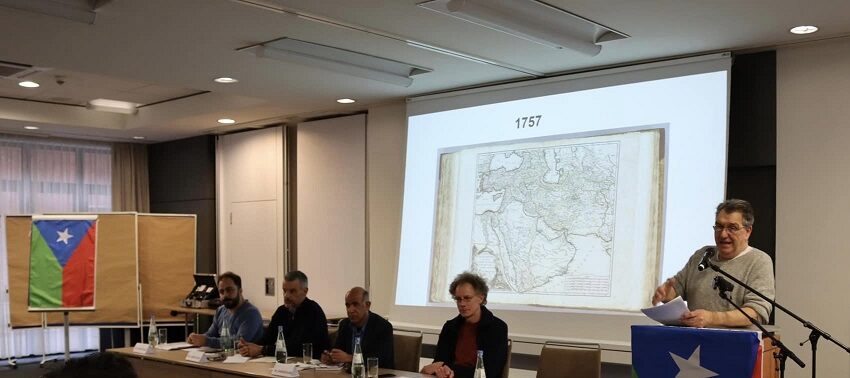Indian State Should Focus on Unconventional Methods: Jamal Nasir Baloch
Free Balochistan Movement Seminar in Germany highlights the story of unheard Balochistan

HAMBURG/GERMANY: The Free Balochistan Movement organized a seminar on March 25 in Hamburg, Germany, titled “Unheard Balochistan, Past and Present” on the occasion of the day of the occupation of Pakistan Occupied Balochistan.
The seminar aimed to raise awareness about the Balochistan crisis as a regional issue, which is often overlooked on the international stage. The aim of the seminar was also to bring to the attention of the international community the human rights challenges faced by the Baloch independence movement.
The event brought together several distinguished guest speakers, including Dr Martin Axmann, a renowned German writer and political scientist, Karlos Zurutuza, a journalist from the Basque country in Spain, Joachim Griesbaum, the European coordinator of ICOR, Kawe Fatehi, a representative of the Free Life Party Kurdistan, and Dr Shahzavar Karimzadi, the vice president of the Free Balochistan Movement.
The seminar also included a question and answer session where the speakers addressed queries from the members of the audience.
Karlos Zurutuza, a seasoned journalist and a keen observer of Balochistan, expressed his views on the rich and diverse resources of the Balochistan region.
He said Balochistan was endowed with an abundance of valuable resources, including gold, silver, gas, and oil, making it one of the richest regions in the world. However, he added that despite its vast resources, the people living in the region have not been able to benefit from them. He emphasised that the global community needs to recognise this issue and take action to address it.
Zurutuza further noted that the problems faced by Balochistan have similarities with those of other regions, such as Kurdistan and Western Sahara in Africa. He pointed out that while there are some differences between the Western and Eastern parts of Occupied Balochistan, the restrictions on freedom of expression are severe on both sides of the ‘border’ which the Baloch term as a colonial line diving their homeland. He said he believes that social media can be an effective tool to raise awareness about Balochistan’s issues on the global stage.
Dr Martin Axmann, a renowned German writer and author of the book “Back to the Future” on the history of Balochistan and Baloch Nationalism, spoke at the seminar about Baloch people’s struggle for freedom and the lack of international attention on Balochistan at the geopolitical level in the region despite being a conscious movement that has persisted for the last two decades and braved various difficulties and challenges.
Dr Axmann shared his personal experience of visiting Pakistan from India for his research, where he found similarities between India and Pakistan in terms of people, culture, history, and ways of living until he entered Balochistan. He found a completely different landscape, people, culture, and language in Balochistan and became interested in knowing more about the Baloch people. However, he faced a shortage of literature on the subject, which motivated him to start his research about ‘a blank space on the world map’.
Dr Axmann described Pakistan as an unnatural state and the nationalism of the Baloch nation as not deep and strong. He asserted that there was division, lack of unity and central leadership in Balochistan and ‘this is the reason why Balochistan is occupied and divided today.’
He further explained that at the time of the formation of Pakistan, India had a complete army formed by the British, which was divided and given military power to Pakistan, but there was no help for the Baloch, and this is why Pakistan occupied Balochistan within a few months of its formation.
When asked about the China-Pakistan Economic Corridor (CPEC), Dr Axmann stated that he believes it is being made for military purposes than commercial use. However, considering the Baloch armed resistance, he said, he does not see any likelihood of success for this project.
Joachim Griesbaum and Kawe Fatehi spoke about the importance of International Solidarity between oppressed groups and nations. Mr Griesbaum said he had no idea about the atrocities against Baloch people until he met political activists from Balochistan.
Mr Fatehi said that both the Baloch and Kurds were facing similar challenges and oppression at the hands of their occupiers and there was a need for cooperation and solidarity among both nations.
He said that the ‘Women, Life, Freedom’ slogan was first introduced by Kurdish leader Abdullah Ocalan but the current Iranian groups are misinterpreting and creating controversies about this slogan because, without the freedom of oppressed nations, the freedom of their women was also not possible.
Dr Shahzavar Karimzadi, the Vice President of the Free Balochistan Movement, highlighted the ongoing human rights violations in Balochistan, particularly incidents of targeting and disappearance of women and learned and educated youth.
Dr Karimzadi emphasised that the national liberation movements of Balochistan and Kurdistan serve as a ray of hope for oppressed and subjugated nations in the region. He further noted that if Germany, which was once divided under the rule of 39 countries, could become a united state again and become the largest economy in the world, then Balochistan could also become a united independent state.
Dr Karimzadi stressed the need for advancing the struggle with understanding and unity by forgetting mutual differences. His remarks suggest a call for unity among Baloch nationalists to achieve the common goal of an independent Balochistan.
The FBM Vice president concluded the session with views that the 21st century is the century of freedom ‘the freedom of women, the Kurds and the Baloch.’









